Most of Chapter 1 will be focused on my parents’ wedding. My father, Alexander Whitecross Harkness and my mother, Rhoda Campbell MacGillivray got married on October 4th, 1940. He was 24 years old, while she was 19.
My father can be seen in uniform with one stripe, indicating that he was a sub-lieutenant in the RNVR.1 During the Second World War, my father was perhaps also involved in the hostilities. I’m not sure how far his involvement went because he was an officer in the Volunteer Reserve.
However, during a phone call with my younger brother Gavin on August 5, 2022, he informed me that our father was in Antwerp at the end of the war. The Germans were bombing the area with V1 and V2 bombs, which resulted in thousands of deaths and casualties.23
He wears his naval cap at a cocky angle, as was the flashy style of American officers during WWII (at least in the movies). My father was not very tall– about 5 foot 8 inches. He looks rather slim in the photo, but I remember him as being well-built with a broad chest.
My mother looks pretty in the photo. We can clearly see how she was not embarrassed nor was trying to hide her ‘gawky’ teeth; this is a family trait that I, thankfully, did not inherit.4
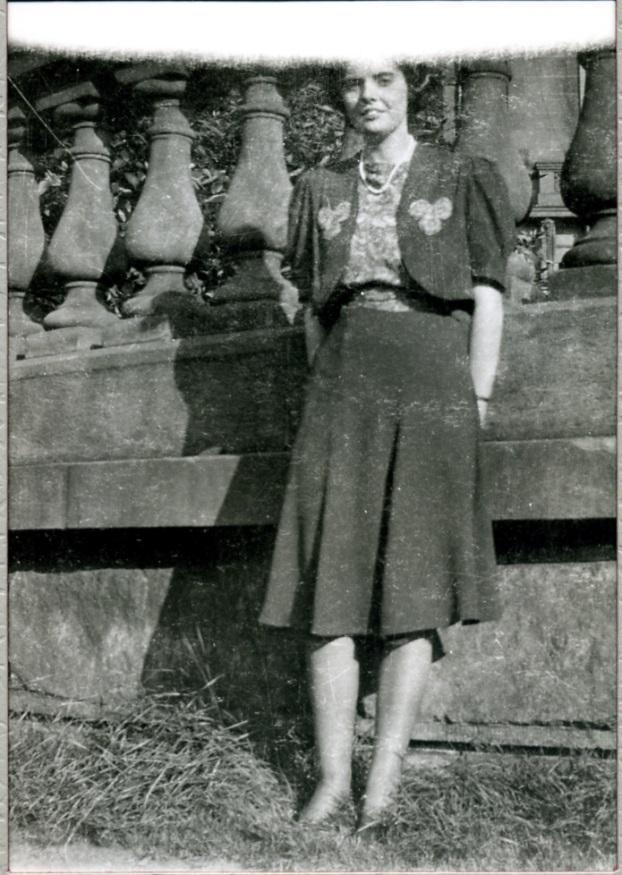 | 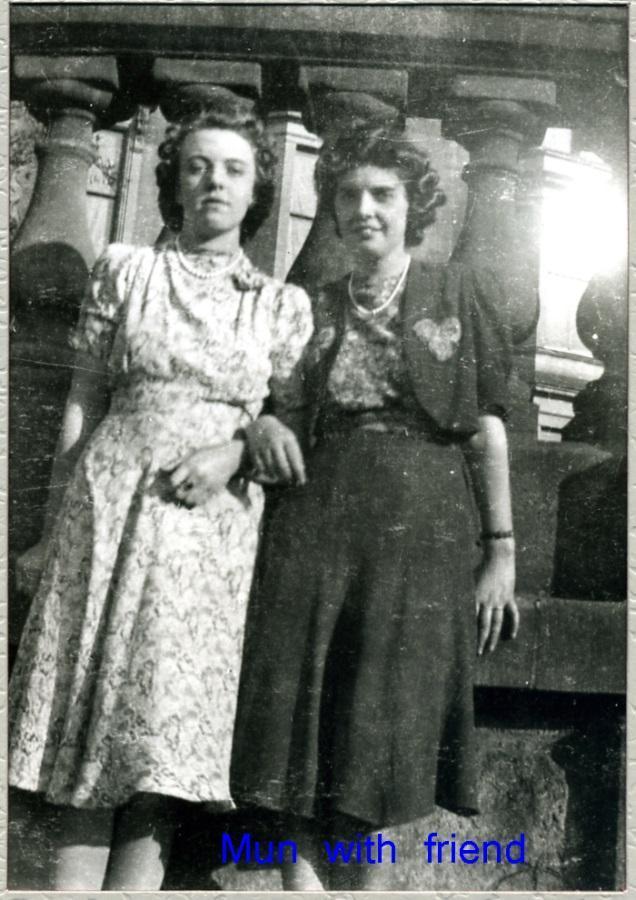 | 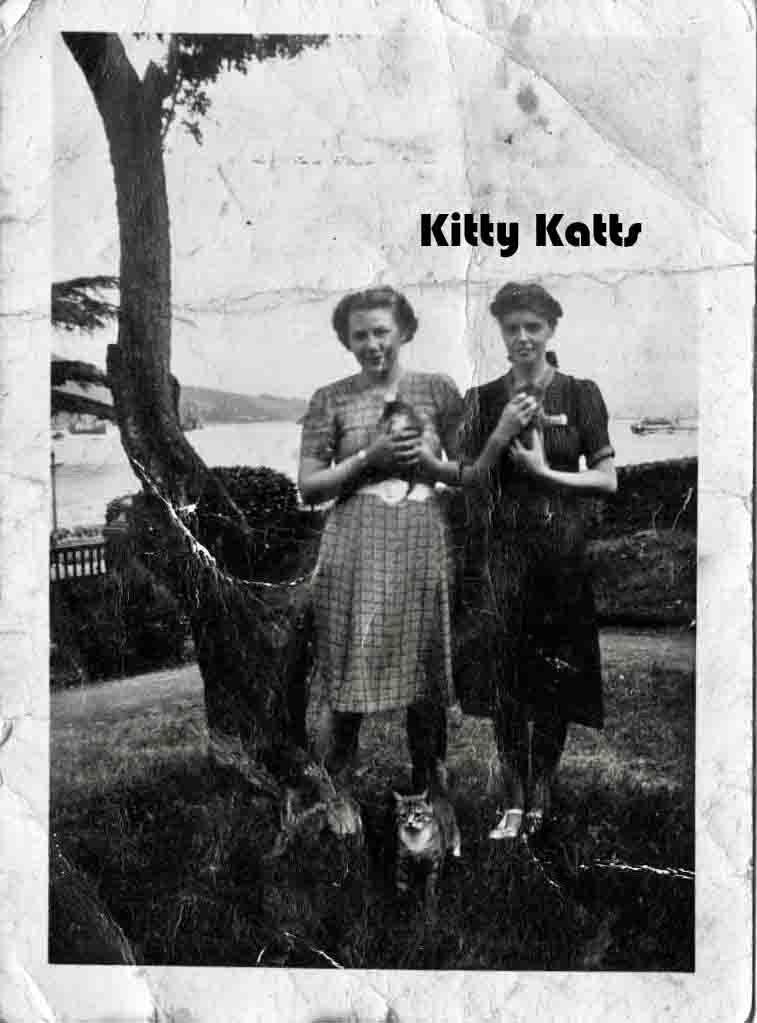 |
Best wishes from Mrs Campbell
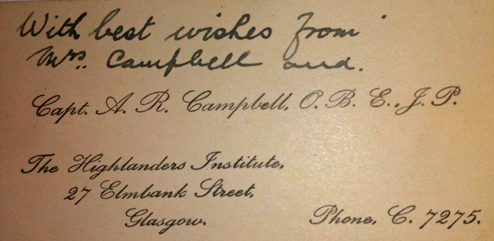
This is a business card saying “best wishes” from Mrs Campbell. Her husband is Capt. A. R. Campbell, who was Manager of the Highlanders’ Institute.7
Marriages during Wartime
Wars seem to have an impact on birth, marriage, and divorce rates. In fact, the marriage rate in Britain increased dramatically at the start of the Second World War,8 while the divorce rate skyrocketed at the end. This is also interesting in relation to the increase in the divorce rate during the Covid Pandemic (2022).
So, yes. War may have greatly disrupted people’s lives, but it didn’t stop my parents, and the many other people, from getting married or having children. Both my mother’s and father’s grandparents were married during the First World War; my father was born during the First World War; my three eldest brothers were born during the Second World War.Such disruptions include the inability to just travel to places for days on end without having some ‘official’ reason.
This letter written by the DGWO just a few days before my parents’ wedding is one proof of it. DGWO stands for Degaussing9 Wiping Officer, H.M.D.10 Ardnadam Pier,11 Sandbank, Argyll. As mentioned, my father was an officer in the RNVR. He was stationed at Holy Loch. Thus, when he wanted to get married, he had to apply to his commanding officer: This confirms that Sub Lieutenant Harkness, RNVR, has been granted three days of compassionate leave as he intends to get married.
My Parents’ Wedding Festivities
Determining the exact movements of my father and mother during this time period is obviously impossible. My father had a “three-day leave”, but the wedding, hotel stay, and visit to the theatre all seem to have taken up about five days. Hence, these succeeding descriptions will be based on a number of assumptions.
My father’s “headquarters” was in Glasgow, but he was working in Holy Loch, some way from Glasgow. Hence, I am left to assume that at this point in time, he probably had naval duties in Glasgow and was sometimes billeted at the Highlanders Institute.
To make the recollection of their meeting and wedding easier to visualize, I have decided to write a semi-fictional version of these events based on the information I have gathered. You can read it here: Wedding Festivities
1 My father was a TEMPORARY ELECTRICAL LIEUTENANT. See the following webpage for 1941: https://digital.nls.uk/british-military-lists/archive/93232114?mode=transcription Read: 5 August 2022.
2 HMS Royal Athelstan (on which my father worked) seems to be docked at Antwerp around 1945 https://www.unithistories.com/officers/RNVR_officersD.html
3 The situation elsewhere in the country was no different from that of Antwerp. From September 1944 to the end of March 1945, the German supreme command directed the use of V1 and V2 bombs against Belgium. According to research, these bombs killed 8,000 people, hitting just over 9,000 targets. Antwerp was hardest hit. This was largely due to the port which was of particular interest. The Germans still wanted to block the supply of Allied army equipment.
The V-weapons were also used as a revenge offensive. The terror caused by the bombings was designed to instil fear among the population and the Allies.The figures for Antwerp and the surrounding regions vary. One study mentions at least 4,229 casualties in Antwerp and in the neighbouring municipalities. Another estimate puts the number of civilians killed in Greater-Antwerp at 2,910 to 2,957, in addition to 600 military casualties. Over 5,200 people were injured or went missing. Over 50,000 houses were estimated to have been destroyed.
It would take several decades to rebuild all of these houses. https://www.antwerpcommemorates.be/themes/bombardementen-en-v-bommen-op-antwerpen Read: 5 August 2022.
4 According to one family rumour, my elder brother Stuart was so vain that he had his two protruding front teeth removed and replaced with false teeth. According to my mother, my father lost all of his teeth when he was 16 years old after falling off a tram. All of this is related to the English having a reputation for having ‘gawky’ teeth. Hugh Grant, the English actor, managed to make ‘gawky’ sexy. It’s a pity that this happened years after my brother had his front teeth extracted.
As previously stated, my mother was not embarrassed about her protruding teeth as a young woman, as can be seen from the wedding photo. My eldest brother, on the other hand, must have been embarrassed about his teeth because he always smiled with his mouth closed. Unfortunately, because I admired my older brother, I imitated his ‘closed-mouth’ smile, despite the fact that I didn’t have ‘gawky’ teeth. As a result, I was never able to imitate a ‘Brad Pitt’ smile.
The ‘English teeth’ syndrome is more about politics than genetics, which we won’t get into here. However, during the post-war period, radical socialists attempted but failed to make dental treatment free. (https://peopleshistorynhs.org/encyclopaedia/nhs-teeth/ ). In other words, the ‘gawky’ teeth of the English can be explained by the high cost and incompetence of the dental services, in comparison to other countries, such as the US and the Scandinavian countries, amongst others.
7 https://digital.nls.uk/an-comunn-gaidhealach/archive/125146088?mode=transcription Read: 12 June 2022.
8 https://www.ons.gov.uk/peoplepopulationandcommunity/birthsdeathsandmarriages/articles/victoryineuropedayhowworldwariichangedtheuk/2015-05-08 Read 1 August 2022.
9 Degaussing, named after the unit of magnetism, is the process in which you decrease or eliminate something’s magnetic field. During World War II, this tactic was used to reduce ships’ magnetic signature so they could pass over a magnetic mine undetected and unharmed. https://www.apexmagnets.com/news-how-tos/a-brief-history-of-magnets-degaussing-ships-during-world-war-ii/ Date of reading: 2 Jan. 2021.
10 The internet provides useful information about “Young John” and “Girl Ethel” on the Naval History Homepage: “Degaussing Mobile Wiping Units – steam drifters BRACKENDALE, GIRL ETHEL, MARY J MASSON, YOUNG JOHN, all in Clyde.” http://www.patriotfiles.com/archive/navalhistory/xDKWW2-4201-40RNShips3WApproaches.htm
11 Ardnadam Pier was part of the Holy Loch base, and it is only a couple of miles away from where my parents lived in Rannoch Cottage, Queen Street, Dunoon, and where my two eldest brothers Sandy and Stuart were born.
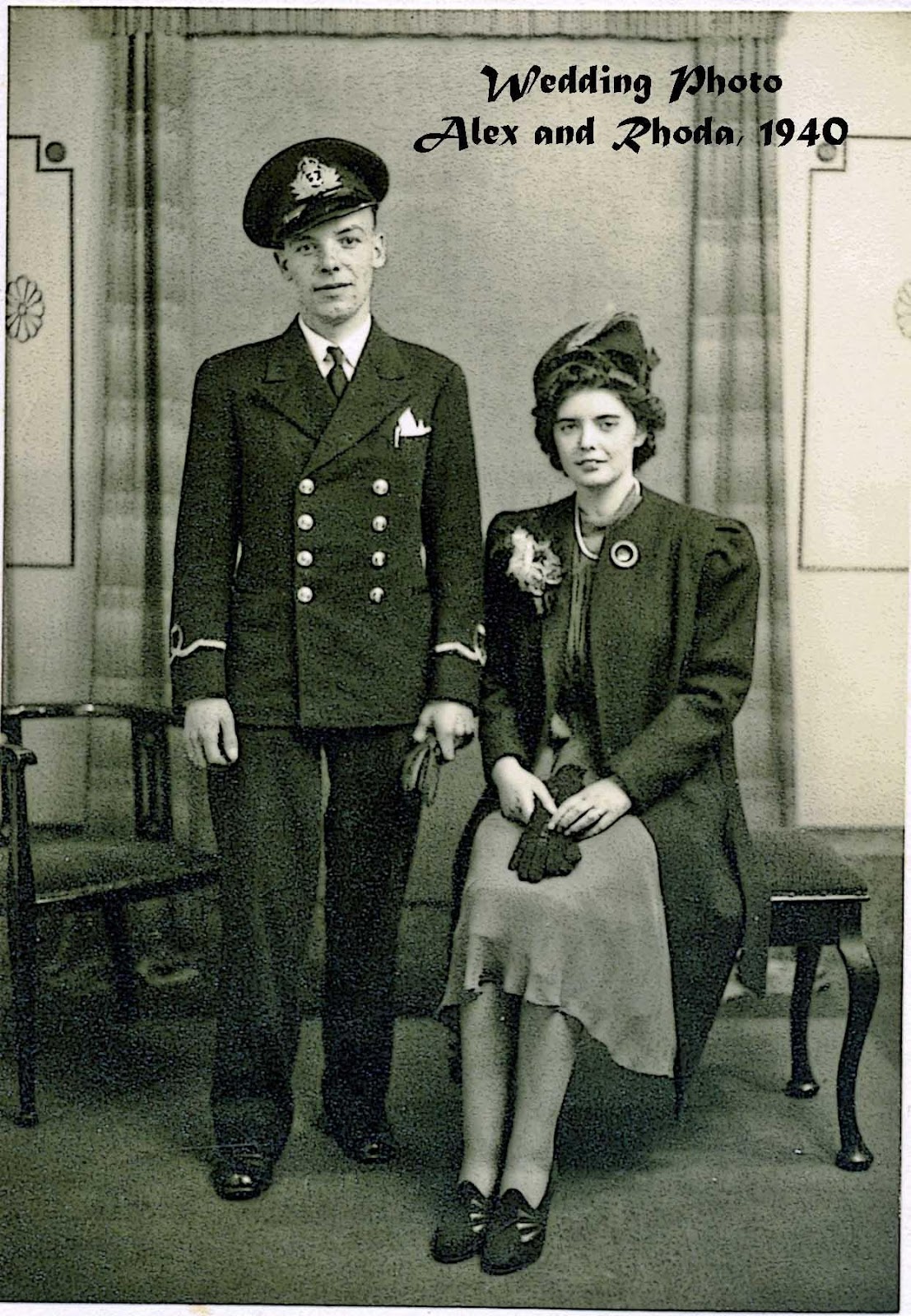
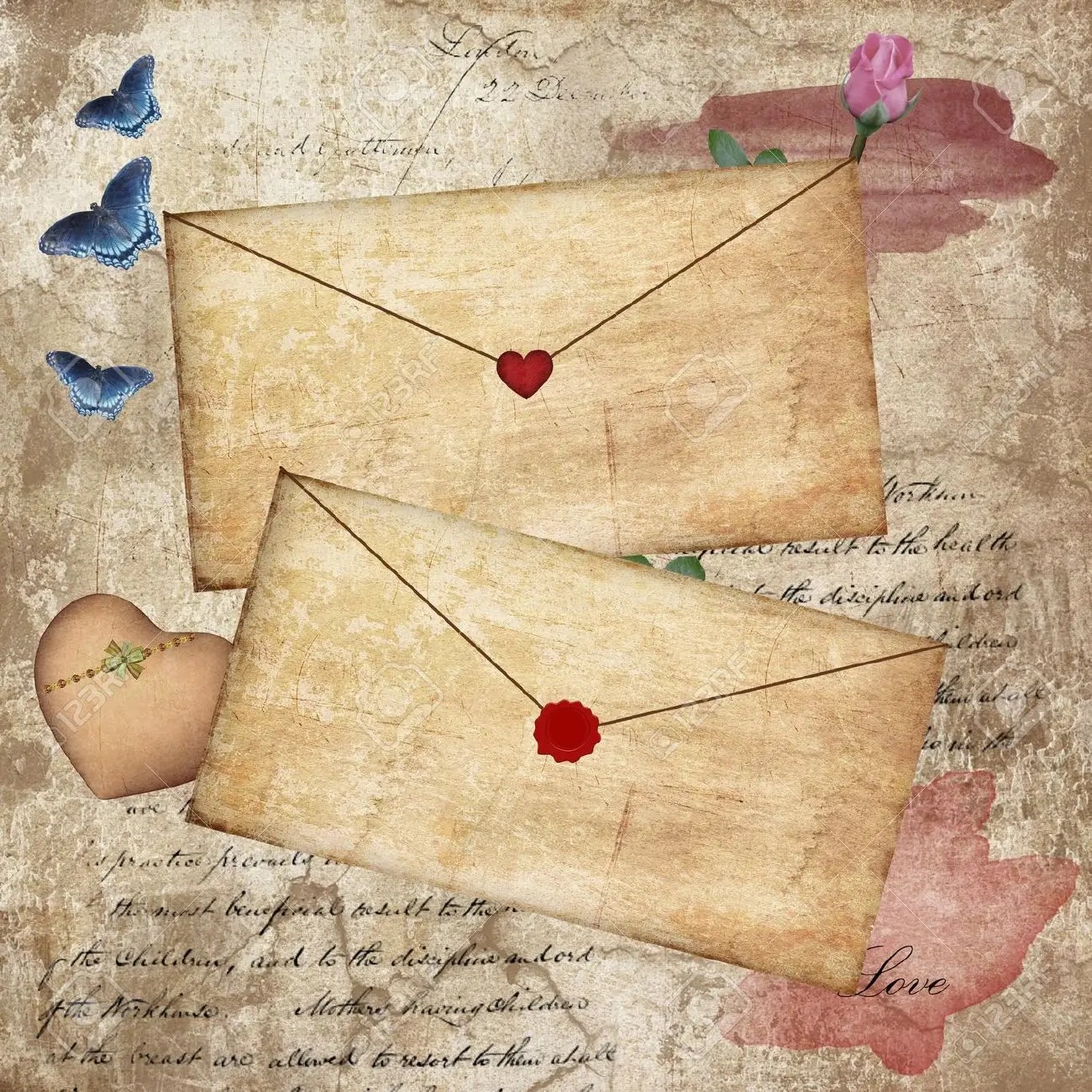
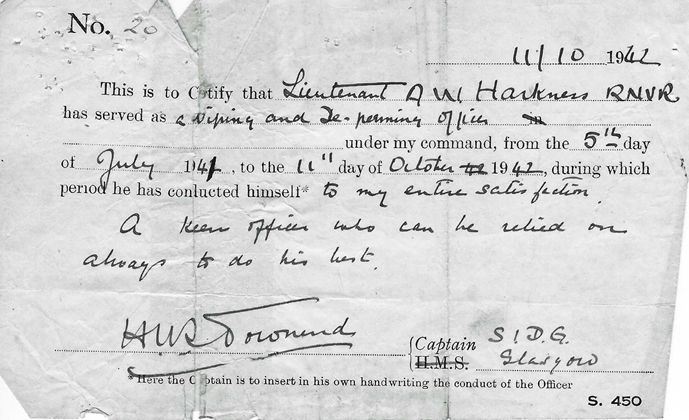

One Reply to “My Parents’ Wedding”